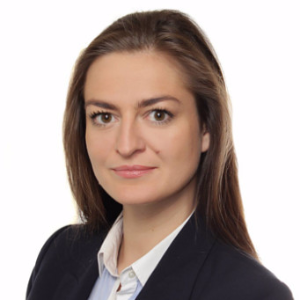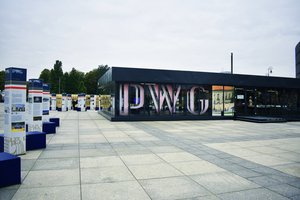Our region should get to know itself better
Poland.pl: The CEE Innovators Summit will be held in Warsaw soon – hundreds of entrepreneurs from Visegrad Group countries will come to the Polish capital to discuss cooperation and development. Where did the idea to organize such an event come from?
Eliza Kruczkowska: The idea came from Prime Minister Beata Szydło during last year's economic forum in Krynica. At the event she announced that innovators from across Central Europe would come to Poland in the spring. The starting point for this meeting will be the summit of prime ministers of the Visegrad Group. Over the past 25 years of its existence, the V4 had clear-cut political goals such as joining NATO and the EU. I think the group is in the process of redefining itself. In this respect, regional economic cooperation should be strengthened.
We are meeting with entrepreneurs from the region not only for the sake of meeting, but also to think of our constellation through a business prism. Often when we speak about international expansion, we are talking about the distant fields such as China. Perhaps it is worth – and also easier – to talk with our V4 partners. Also because large investors from across the ocean see our countries as one spot on the map. It is in our interest to support each other and not necessarily compete amongst ourselves. The Summit also helps us get to know each other better, to see what unites us and what divides us, whether we have common problems.
Apart from the CEE Innovators Summit, what tools can contribute to the strengthening of this cooperation?
Also important here is the role of the Visegrad Fund, which supports cross-regional business start-ups and innovators. The summit was created through a three-pronged cooperation between the Polish Development Fund, the Office of the Prime Minister and the Visegrad Fund.
What will the summit look like?
The Polish Development Fund is responsible for the substantive part of the event. We divided it into four parts – economy, digitization of Central and Eastern Europe, challenges facing innovators and V4 regional policy. We invited Prof. Mariana Mazzucato, author of "The Entrepreneurial State: Debunking Public vs. Private Sector Myths” to take part in the first economic segment of the conference. The book was published in Polish this year, with the foreword written by the Minister of Development Mateusz Morawiecki. Mazzucato argues that the government is the best investor, innovator and risk taker, and that public administrations should take on the burden of investing in high-risk projects such as innovative projects. Mazzucato also examines the example of Apple, a company that used technology funded in the 1970s by the US government such as the LCD, Internet or GPS display and put them into a single marketing project in the form of the iPhone. If not for the government's investment, and that of the American army, no company would have achieved this so quickly. These are quite controversial theses, but they create an interesting basis for a discussion on how much the state should be a "night watchman" and to what degree it should carry out projects itself. We also want the formula of the summit to be innovative and to use the TED Talks format – a 15-20 minute, dynamically told story. In the section devoted to the economy we will also present a report prepared by the Polish Development Fund titled "Financing High Risk Innovation in Central and Eastern Europe" based on venture capital research for 2015-2016.
What will the digitization segment focus on?
Apart from the Minister of Digitisation Anna Streżyńska, the main guest here will be Linnar Vikk, a member of Estonia's e-government council. Vikk has been advising the Estonian government for over 20 years and is responsible for ideas such as e-residency and helped create Estonia’s e-revolution. We want to merge this with regional action.
Does this mean that we’re heading in this direction?
Yes, the digitization of the administration led by Minister Anna Strezynska is moving in this direction. The question is to what degree can this be done as well and as fast in a country such as Poland. Estonia has less than 1.5 million inhabitants. There is a difference in scale, different challenges.
The third part of the forum will focus on these challenges.
It will be opened by the Minister of Science and Higher Education Jarosław Gowin – work is currently being carried out in his ministry on legislation to support innovation. It is very important for entrepreneurs in the hall to hear about the changes, which are key from their point of view. In this part of the programme entrepreneurs will be given the floor. Mikolaj Malaczyński from Legimi will talk about expansion abroad – in the German and Chinese markets. His company is something like Spotify, but instead of music there are books. Małaczyński is an example of a courageous entrepreneur who will talk about challenges facing start-ups eager to go beyond the local market and succeed in the world.
I think the summit also provides a good opportunity for the administration to hear first-hand accounts. Often these two worlds do not meet. My goal is to stimulate dialogue between business and the political leadership.
In this section, we will also be able to listen to Michal Pechoucek from the Czech Republic, who is the founder of the Cognitive Security start-up from the security sector. Interestingly, the Czech Republic has some good examples of companies in this field. A few years ago, Pechoucek had a so-called exit - the dream of most start-ups founders. The idea is for someone to invest in a start-up and then for the value of their business to increase enough so that it can be sold or bought by a large company. Cognitive Security was bought by Cisco, one of the global security and IT majors.
Some entrepreneurs in our region are successful, but a lot of people still go abroad because they do not see a chance for themselves at home.
The brain-drain is a challenge for our entire region. Viktor Schmidt, the CEO of Netguru will be speaking at the conference about how to retain talented people in the region. His company is growing at a rate of 50% per annum, not that long ago it employed 10 people and now it has grown to 200 employees. One of the biggest challenges facing employees is access to employees, because those who are most capable either leave or work remotely for foreign clients.
One of the entrepreneurs presenting will be Marek Gutt-Mostowy, the founder of Euroloop, who claims that he is able to connect Warsaw with Wroclaw within 20 minutes thanks to HyperLoop, a high-pressure train. Some time ago Elon Musk announced that he would love to connect Los Angeles and San Francisco with such a line. Musk challenged the world to design such a means of transport, a challenge that was taken on by students around the world. Marek Gutt-Mostowy and his international team reached the finals of the competition and received an innovation award. According to Marek Gutt-Mostowy, Poland is the best country in Europe to build such a HyperLoop. However, everyone’s hands would shake before investing in such a project.
Today it seems to be an idea straight out of space.
On the other hand, however, innovation is taking place. Now the question is who will bet on it. It is difficult to expect the administration to say, "Go for it boys, I’ll give you 30 million."
And the Polish Development Fund?
That is why we invited Marek to the conference to listen to his ideas.
Susan Wójcicki, the CEO of Youtube, will also be taking part in the event.
Susan Wojcicki, probably the 16th Google employee. It was her garage that was rented out to two IT students for $1,700 in 1998, who had been there for half a year and developed Google when they subsequently moved to a normal office.But that's where the legend of Google was born. This will be the first visit of Susan Wojcicki to Poland – she’s only coming for a few hours. Interestingly, she is the daughter of a Pole. I think it will be interesting to show her how much Poland has changed.
Returning to regional affairs – where do our strengths lie, as Poland, as the Visegrad Group?
We have great programming skills. According to the ranking of Hacker Rank Poland has, after China and Russia, the third best programmers in the world. The Czech Republic, Hungary and Slovakia are also high up in this ranking. The former communist bloc is generally strong in programming. Over the years mathematics was drilled in to our heads and this is where these skills mainly come from. This is also how people abroad talk about us.
We can also work hard, which puts us in a better position than Western European countries. We are brave, we are not afraid to take on certain challenges, although we lack certain things, such as business “audacity” in our efforts to seek out an investor, something that the Israelis pride themselves on. We are still a little too withdrawn, we lack a certain foreign flare. Perhaps the cooperation in the V4 will be an incentive to help us overcome these barriers.
What are Polish start-ups missing?
You have to ask them. There are certainly problems with access to capital. Without public aid, this market would be very limited. This applies not only to Poland but to the entire region. The problem is also that start-ups seeking funding at a later stage of development must look for it abroad.
Can you give examples of the most successful Polish start-ups, also those on the international stage?
I commissioned such a ranking of the 10 highest rated Polish start-ups. It is certainly includes DocPlanner, Estimote, LifeChat, CD Projekt. Although not everyone in the world is so aware of IT products that they realize that these start-ups are from Poland. Amazon bought the Polish company IVONA Software, the producer of a speech synthesizer.
How does it look from the perspective of the PFR? What criteria must a start-up meet in order for you to decide to invest in it?
First of all, we do not do direct investment. When it comes to start-ups, we create a fund of funds – PFR Ventures. We select financial intermediaries who invest directly in start-ups. We are just about to start the selection of the first fund starter – a one-time investment of between 200,000 zł and 3 million zł, investments at a very early stage. We provide investment at 80% of the project, start-up needs to have 20% of its own funds. As a result, we create leverage private capital. The investment will be decided by professionals who are familiar with the industry and the latest trends, not the officials.
Looking at a map of the development of innovation in Poland it is visible to the naked eye that cities such as Warsaw and Krakow clearly excel over the cities such as Lublin and Bialystok. Does the PFR also attach importance to these inequalities?
When thinking of PFR, we also think of the entities that are part of our group as the Polish Agency for Enterprise Development, implementing the "start-up platforms." These are efforts to support development in eastern Poland. Bialystok, Kielce and Lublin create such start-up platforms –more than 1,000 business ideas were submitted from each of these cities. These ideas are then considered and the best ones are incubated - they can receive up to 800,000 zł.
There is a lot more talk about start-ups these days, not only in the specialist media. The government has high hopes for the development of start-ups. Can we call ourselves the awakening European start-up tiger?
I would rather say that we are a growing, maturing baby tiger. From the point of view of Silicon Valley and Israel, our ecosystem is at a very early stage of development. In Poland, one can count on one hand the number of people who emerged from Wirtualna Polska or Onet – business created in the 1990s – and who are creating more companies. More time needs to pass for the owner of a company such as CD Projekt to start educating the next generation of entrepreneurs. What's encouraging is the fact that the potential is there, as is the desire to try.
Poland.pl

Eliza Kruczkowska is an Innovation Director at the Polish Development Fund. She was previously CEO at the Startup Poland Foundation.
27.03.2017







